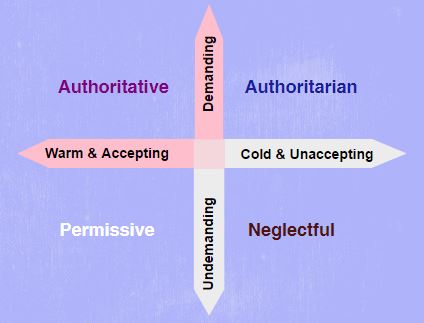Kinh Nghiệm Hướng dẫn What do you call a complex process in which parents and children both impact one another? 2022
Bùi Đức Thìn đang tìm kiếm từ khóa What do you call a complex process in which parents and children both impact one another? được Update vào lúc : 2022-10-28 07:22:09 . Với phương châm chia sẻ Mẹo về trong nội dung bài viết một cách Chi Tiết 2022. Nếu sau khi tham khảo nội dung bài viết vẫn ko hiểu thì hoàn toàn có thể lại Comment ở cuối bài để Tác giả lý giải và hướng dẫn lại nha.| Diana Baumrind’s Parenting Styles Theory | Statistics | Definition and Effects on Kids | The Most Effective Parenting Style | Nature vs Nurture | Other Parenting Styles | Infographic |
Nội dung chính Show- Diana Baumrind’s Parenting Styles TheoryStatistics on Different Types of Parenting StylesParenting Styles Definition and Their Effects on
Children’s Behavior1. Authoritative Parenting2. Authoritarian Parenting3. Permissive Parenting (Indulgent)4. Neglectful Parenting (Uninvolved)Which Parenting Style Is The Most Effective?Cultural and Ethnics
DifferencesChild TemperamentParenting Styles vs Parenting PracticesLimitations And Criticisms Of Parenting StudiesWhich parenting style is most encouraged in
modern America?Nature Vs NurtureOther parenting stylesAttachment parentingHelicopter parentingTiger parentingFree-range parentingParenting Styles Chart InfographicWhat is a mother complex called?What is the Oedipus complex in simple terms?What is an example of Oedipus complex?What is Oedipal stage in psychology?
The 4 parenting styles commonly used in psychology are authoritative parenting style, authoritarian parenting style, permissive parenting style, and neglectful parenting style. They are based on the work of Diana Baumrind, a developmental psychologist the University of California Berkeley, in the 1960s. Maccoby and Martin also contributed by refining the model in the 1980s.
The four types of parenting styles are also known as:
- Authoritative
(Democratic)Authoritarian (Disciplinarian)Permissive (Indulgent)Neglectful (Uninvolved)

Diana Baumrind’s Parenting Styles Theory
Baumrind noticed that preschoolers exhibited distinctly different types of behavior. Each type of behavior was highly correlated to a specific kind of parenting.
Baumrind’s theory posits that there is a close relationship between the type of parenting style and children’s behavior. Different parenting styles can lead to different child development and child outcomes.
Based on extensive observation, interviews, and analyses, she initially identified three parenting styles: authoritative parenting, authoritarian parenting, and permissive parenting1.
 credit:
wikipedia.com
credit:
wikipedia.comAlthough Diana Baumrind is known for her work on categorizing parenting styles, Maccoby and Martin (1983) were the ones who expanded this 3-parenting-styles model using a two-dimensional framework2.
They expanded Baumrind’s permissive parenting style into two different parenting types: permissive style (also known as indulgent parenting style) and neglectful parenting (also known as uninvolved parenting style).
These four parenting styles are sometimes called the Diana Baumrind parenting styles or Maccoby and Martin parenting styles.
Statistics on Different Types of Parenting Styles
In the US, roughly 46% of parents use an authoritative parenting style, 26% authoritarian parenting style, 18% permissive parenting style, and 10% neglectful parenting style3.
The distribution is relatively stable within the population, except that European-American parents are about 2% more likely to have an authoritative style, while Asian-American parents are 2% more likely to have an authoritarian style.
Parenting Styles Definition and Their Effects on Children’s Behavior
Parenting styles are categorized based on two dimensions of parenting behavior and styles:
Demandingness refers to the extent to which parents control their child’s behavior or demand their maturity.
Responsiveness refers to the degree to which parents are accepting and sensitive to their children’s emotional and developmental needs.
Here are the impacts of parenting styles on child development.

1. Authoritative Parenting
High demandingness. High responsiveness.
Authoritative parents have high expectations for achievement and maturity, but they are also warm and responsive4.
These types of parents set rules and enforce boundaries by having open discussions, providing guidance, and using reasoning.
These parents provide their kids with reasoning and explanation for their actions. Explanations allow children to have a sense of awareness and teach kids about values, morals, and goals.
Their disciplinary methods are confrontative5, i.e. reasoned, negotiable, outcome-oriented, and concerned with regulating behaviors as opposed to coercive.
Authoritative parents are affectionate and supportive. They respect their children’s autonomy, provide them with a lot of freedom and encourage independence.
They also allow bidirectional communication. This style of parenting is also known as the democratic parenting style6.
Children of authoritative parents are cherished.
Based on Baumrind’s research on parenting styles, children of authoritative parents tend to7:
- Appear happy and content.Are more independentAre more
active8.Achieve higher academic performance8–10.Develop good
self-esteem11.Interact with peers using competent social skills12.Have better mental health — less depression, anxiety, suicide attempts, delinquency, alcohol and drug
use13–15.Exhibit less violent tendencies16.Are
securely attached.

2. Authoritarian Parenting
High demandingness. Low responsiveness.
High levels of parental control and low levels of parental responsiveness are the two characteristics of the authoritarian style.
Although authoritarian parenting and authoritative parenting styles have similar names, they have several important differences in parenting beliefs, demands, and approaches.
While both parental styles demand high standards, authoritarian parents demand blind obedience using reasons such as “because I said so“. They only allow one-way communication through strict rules and orders. Any attempts to reason with them are seen as backtalk.
These parents use stern discipline and often employ harsh punishment, such as corporal punishment, as a way to obtain behavioral control. Their disciplinary methods are coercive5, i.e. arbitrary, peremptory, domineering, and concerned with marking status distinctions.
Authoritarian parents are unresponsive to their child’s needs and are generally not nurturing. They usually justify using mean treatment to toughen up their kids.
Children whose parents have an authoritarian parenting style tend to:
- Have an unhappy disposition.Be less independent.Appear insecure.Possess low self-esteem.Exhibit more
behavioral problems or conduct issues17.More temper tantrums.Perform worse academically.Have poorer social
competence.
Be more prone to internalizing behavior and mental issues18.Be more likely to have drug use
problems19.Have worse coping skills20.

3. Permissive Parenting (Indulgent)
Low demandingness. High responsiveness
Permissive parents set very few rules and boundaries and they are reluctant to enforce rules.
These indulgent parents are warm and indulgent but they do not like to say no or disappoint their children.
Children of permissive parents tend to have the worst outcomes:
- Cannot follow rules.Have worse self-control.Possess egocentric tendencies.Encounter more problems in
relationships and social interactions.

4. Neglectful Parenting (Uninvolved)
Low demandingness. Low responsiveness.
Neglectful parents do not set firm boundaries or high standards.
They are indifferent to their children’s needs and uninvolved in their lives.
These uninvolved parents may have mental issues themselves such as depression, physical abuse, or child neglect when they were kids.
Children of neglectful parents:
- They are more impulsive.Cannot self-regulate emotion.Encounter more delinquent behavior and addiction problems.Have more mental issues — e.g. suicidal behavior in adolescents.
Which Parenting Style Is The Most Effective?
From decades of studies, research shows that authoritative parenting is consistently linked to the best outcomes in kids.
The authoritative parenting style is considered the best parenting style by psychologists and psychiatrists.
This classification of child rearing styles has been studied for over 25 years in different countries.
Results are generally found to be as expected for each parenting style.
However, inconsistencies and exceptions in some areas remain.
Here are some important factors that may also play a part in determining how a child turns out.
Cultural and Ethnics Differences
Some studies found that the authoritative style isn’t always linked to the best school achievement across families from diverse ethnic (e.g. Asian, Black, Hispanic) and socioeconomic backgrounds (e.g. income level, parental education, number of active parents)21.
For example, in one study, researchers found that African-American students with authoritative parents but without peer support did not perform the best academically.
As for Asian-American students, in some studies, they performed the best in school when they had authoritarian parents and peer support22.
In Spain, a study showed that both indulgent and authoritative parenting styles were associated with positive outcomes23.
Child Temperament
Children’s own behavior can affect the parent’s choice and the outcomes, too.
For example, kids with a more sensitive temperament may be perceived as difficult causing the parents to change their parenting style toward more authoritarian.
In a study, it was also found that some aspects of child behavior such as sociable and aggressive behaviors are better correlated to the child’s temperament than to the parenting style of their parents.
It seems like parenting style is not the only determining factor in the child’s outcomes.
Differences in a social context and in child temperaments can make a difference, too.
But it is worth noting that, despite being widely publicized, not all of these study results have been successfully reproduced by other researchers.
In addition, these results are also not consistent across other types of outcomes, such as behavior or mental health.
For example, while some studies found the use of authoritarian parenting in the Chinese American population was associated with the best academic outcomes24, others found authoritative parenting to be the best in predicting school performance25.
To this date, no study has conclusively disproved the benefits of authoritative parenting, while many others have consistently shown its advantages.
Parenting Styles vs Parenting Practices
Another component that can impact the outcome is the distinction between parenting style and parenting practice.
Parenting style is the emotional climate and control in which parents raise their children.
Parenting practices are specific actions that parents employ in their parenting.
Even parents with the same parenting style may choose different ways or different approaches to implementing specific types of child-rearing practices and that will affect the degreeof outcomes.
Limitations And Criticisms Of Parenting Studies
When interpreting research results, it is important to note that most of these parenting studies only find links between parenting styles and outcomes.
That is, the results are only correlation and not causation.
For example, parents who are warm and responsive tend to have children who exhibit fewer behavior problems. One is tempted to say that therefore warm and responsive parents result in better behaving kids.
But you can easily turn that around and say that kids who behave cause their parents to be more warm and responsive.
Different children have different temperaments and they can, in turn, affect parents’ behavior.
This parenting research does not tell us which one is the correct cause-and-effect relationship.
So why do most psychologists and experts still recommend an authoritative parenting style?
One reason is that there are overwhelming volumes of studies showing these connections consistently, including longitudinal studies26 and those involving intervention27.
When choosing a parenting style, parents must consider their parenting goals and the type of parent they want to be.
Most parents’ ultimate parenting goal is to raise a healthy, happy, kind, and responsible person who will love them and their family when they grow up. And they also want to enjoy the experience of parenting.
It is hard to imagine being cold and strict (authoritarian), cold and indifferent (neglectful), or warm and indulgent (permissive) will achieve all of these goals.
Which parenting style is most encouraged in modern America?
Of the four Baumrind parenting styles, the authoritative parenting style is the one that is most encouraged in modern American society.
Also See: Montessori Parenting
Nature Vs Nurture

Nature vs nurture is one of the oldest debates in the history of psychology. Which one matters more?
A recent study by the Queensland Brain Institute and the VU University of Amsterdam has pretty much settled the Nature vs Nurture debate. 14.5 million pairs of twins from almost every twin study ever done in the past 50 years were collected and analyzed28.
Researchers have found that a person’s behavior and character traits are influenced roughly the same by genetics (nature) and by environment (nurture).
Parenting is one of the most important parts of the environment a child is exposed to since birth. Good parenting’s impact on a child is significant and undeniable.
Also See: What is the worst age to lose a parent, Parenting
Other parenting styles
A number of new forms of parenting have surfaced in recent years, and those ideas describe today’s parenting styles perfectly. These are a few of the most popular parenting styles in the United States today.
Attachment parenting
Attachment parenting is a style of parenting aimed meeting the emotional needs of infants responsively through close physical contact and emotional attunement.
Parents create a positive, warm and safe environment where their children can develop trust and closeness. They also give their child enough time to feel comfortable and familiar with the world.
In 1993, William Sears’ book about attachment parenting popularized this parenting style. The parenting practices he recommends are based upon the Attachment Theory developed by psychiatrist John Bowlby.
In Baumrind’s parenting style paradigm, attachment parenting emphasizes responsiveness. Since it focuses on a baby’s early years, there are no references to parents’ demands.
Children with responsive parents tend to have29
- More cognitive competenceBetter CommunicationHealthier social-emotional development
Helicopter parenting
Helicopter parenting is a term used to describe the over-protective attitude and constant involvement of parents with their children.
A helicopter parent hovers over their child, monitors, and controls every aspect of their children’s lives and steps in whenever a problem arises. They tend to control the environment and activities that the child participates in, forcing them to conform to the parent’s expectations, while the same time depriving them of the chance to learn things on their own. This parenting style often interferes with a child’s development and leads to negative results.
This parenting style does not fit neatly under any of Baumrind’s categories. Helicopter parents are typically insensitive to the child’s emotional needs. When the child fails to live up to their high expectations, these parents jump in to help. Therefore, this parenting style is close to authoritarian.
Children raised by helicopter parents tend to have
- Lower self-esteem30Fear of failureMore likely to develop disorders such as anxiety, depression, and drug
abuse31Poor stress coping skills32Less independent
Tiger parenting
Tiger parenting is a strict parenting style. It is alleged to be a common parenting style among Chinese American families, but research has proven otherwise33.
It is characterized by a very strict and harsh set of rules and regulations. Tiger parents create a very rigid environment where the children have very little freedom or choices. Emotional abuse such as shaming and insulting is often used to force children to comply.
A tiger parenting style exemplifies the authoritarian parenting style.
Children of tiger parenting are more likely to have:
- Lower academic performanceLess sense of family obligationMore depressive symptoms
Free-range parenting
Free-range parenting is the practice of allowing children to be more independent than traditional parenting would allow. It is the antithesis of helicopter parenting.
Free-range parents allow children to make decisions and develop a strong sense of responsibility for their own lives. In a không lấy phí-range household, there is less control, less supervision, and more freedom. Children can explore their environment and develop into independent adults. They make choices and learn from the consequences of their choices.
This parenting style emphasizes the child’s right to make decisions and has been described as a natural parenting style that emphasizes self-direction and respect for the child’s needs.
These parents are sometimes accused of neglect in the United States, although the definition of child neglect is sufficiently vague.
According to Baumrind’s parenting classification, neglectful parents are cold and unresponsive and have no demands or expectations from their children. Nonetheless, không lấy phí-range parents can indeed be warm and responsive to their children, but simply believe that children should be given more freedom and autonomy34.
Also See: What To Do When Parents Don’t Agree on Parenting
Parenting Styles Chart Infographic

References
2.
Maccoby EE, Martin JA. Socialization in the Context of the Family: Parent-Child Interaction. In: Handbook of Child Psychology. Socialization, Personality, and Social Development. ; 1983:.
3.
Pong S ling, Johnston J, Chen V. Authoritarian Parenting and Asian Adolescent School Performance: Insights from the US and Taiwan. International Journal of Behavioral Development. Published online November 6, 2009:62-72. doi:10.1177/0165025409345073
4.
Darling N, Steinberg L. Parenting style as context: An integrative model. Psychological Bulletin. 1993;113(39):487-496.
5.
Baumrind D. Differentiating between Confrontive and Coercive Kinds of Parental Power-Assertive Disciplinary Practices. Human Development. Published online 2012:35-51. doi:10.1159/000337962
6.
Miklikowska M, Hurme H. Democracy begins home: Democratic parenting and adolescents’ support for democratic values. European Journal of Developmental Psychology. Published online June 28, 2011:541-557. doi:10.1080/17405629.2011.576856
7.
Steinberg L, Lamborn SD, Dornbusch SM, Darling N. Impact of Parenting Practices on Adolescent Achievement: Authoritative Parenting, School Involvement, and Encouragement to Succeed. Child Development. Published online October 1992:1266. doi:10.2307/1131532
8.
Spera C. A Review of the Relationship Among Parenting Practices, Parenting Styles, and Adolescent School Achievement. Educ Psychol Rev. Published online June 2005:125-146. doi:10.1007/s10648-005-3950-1
9.
Nyarko K. The influence of authoritative parenting style on adolescents’ academic achievement. AJSMS. Published online September 2011:278-282. doi:10.5251/ajsms.2011.2.3.278.282
10.
Strage A, Brandt TS. Authoritative parenting and college students’ academic adjustment and success. Journal of Educational Psychology. Published online 1999:146-156. doi:10.1037/0022-0663.91.1.146
11.
McClun LA, Merrell KW. Relationship of perceived parenting styles, locus of control orientation, and self-concept among junior high age students. Psychol Schs. Published online October 1998:381-390. https://psycnet.apa.org/record/1998-12495-009
12.
Rankin Williams L, Degnan KA, Perez-Edgar KE, et al. Impact of Behavioral Inhibition and Parenting Style on Internalizing and Externalizing Problems from Early Childhood through Adolescence. J Abnorm Child Psychol. Published online June 12, 2009:1063-1075. doi:10.1007/s10802-009-9331-3
13.
Rothrauff TC, Cooney TM, An JS. Remembered Parenting Styles and Adjustment in Middle and Late Adulthood. The Journals of Gerontology Series B: Psychological Sciences and Social Sciences. Published online January 1, 2009:137-146. doi:10.1093/geronb/gbn008
14.
Newman K, Harrison L, Dashiff C, Davies S. Relationships between parenting styles and risk behaviors in adolescent health: an integrative literature review. Rev Latino-Am Enfermagem. Published online February 2008:142-150. doi:10.1590/s0104-11692008000100022
15.
Zeinali A, Sharifi H, Enayati M, Asgari P, Pasha G. The mediational pathway among parenting styles, attachment styles and self-regulation with addiction susceptibility of adolescents. J Res Med Sci. 2011;16(9):1105-1121. https://www.ncbi.nlm.nih.gov/pubmed/22973379
16.
Jackson C, Henriksen L, Foshee VA. The Authoritative Parenting Index: Predicting Health Risk Behaviors Among Children and Adolescents. Health Educ Behav. Published online June 1998:319-337. doi:10.1177/109019819802500307
17.
Smith JD, Dishion TJ, Shaw DS, Wilson MN, Winter CC, Patterson GR. Coercive family process and early-onset conduct problems from age 2 to school entry. Dev Psychopathol. Published online April 2, 2014:917-932. doi:10.1017/s0954579414000169
18.
Martin G, Waite S. Parental bonding and vulnerability to adolescent suicide. Acta Psychiatr Scand. Published online April 1994:246-254. doi:10.1111/j.1600-0447.1994.tb01509.x
19.
Baumrind D. The Influence of Parenting Style on Adolescent Competence and Substance Use. The Journal of Early Adolescence. Published online February 1991:56-95. doi:10.1177/0272431691111004
20.
Wolfradt U, Hempel S, Miles JNV. Perceived parenting styles, depersonalisation, anxiety and coping behaviour in adolescents. Personality and Individual Differences. Published online February 2003:521-532. doi:10.1016/s0191-8869(02)00092-2
21.
Steinberg L, Dornbusch S. Ethnic differences in adolescent achievement: An ecological perspective. American Psychologist. 1992;47(6):723-729.
22.
Chao RK. Beyond Parental Control and Authoritarian Parenting Style: Understanding Chinese Parenting Through the Cultural Notion of Training. Child Development. Published online August 1994:1111. doi:10.2307/1131308
23.
Garcia F, Gracia E. Is always authoritative the optimum parenting style? Evidence from Spanish families. Adolescence. 2009;44(132):101.
24.
Chao RK. The Parenting of Immigrant Chinese and European American Mothers. Journal of Applied Developmental Psychology. Published online March 2000:233-248. doi:10.1016/s0193-3973(99)00037-4
25.
Chen X, Dong Q., Zhou H. Authoritative and Authoritarian Parenting Practices and Social and School Performance in Chinese Children. International Journal of Behavioral Development. Published online November 1997:855-873. doi:10.1080/016502597384703
26.
Steinberg L, Lamborn SD, Dornbusch SM, Darling N. Impact of Parenting Practices on Adolescent Achievement: Authoritative Parenting, School Involvement, and Encouragement to Succeed. Child Development. Published online October 1992:1266. doi:10.2307/1131532
27.
Pratt MW, Kerig P, Cowan PA, Cowan CP. Mothers and fathers teaching 3-year-olds: Authoritative parenting and adult scaffolding of young children’s learning. Developmental Psychology. Published online November 1988:832-839. doi:10.1037/0012-1649.24.6.832
28.
Polderman TJC, Benyamin B, de Leeuw CA, et al. Meta-analysis of the heritability of human traits based on fifty years of twin studies. Nat Genet. Published online May 18, 2015:702-709. doi:10.1038/ng.3285
29.
Landry SH, Smith KE, Swank PR. Responsive parenting: Establishing early foundations for social, communication, and independent problem-solving skills. Developmental Psychology. Published online July 2006:627-642. doi:10.1037/0012-1649.42.4.627
30.
Locke JY, Campbell MA, Kavanagh D. Can a Parent Do Too Much for Their Child? An Examination By Parenting Professionals of the Concept of Overparenting. Aust j guid couns. Published online December 2012:249-265. doi:10.1017/jgc.2012.29
31.
LeMoyne T, Buchanan T. DOES “HOVERING” MATTER? HELICOPTER PARENTING AND ITS EFFECT ON WELL-BEING. Sociological Spectrum. Published online July 2011:399-418. doi:10.1080/02732173.2011.574038
32.
Odenweller KG, Booth-Butterfield M, Weber K. Investigating Helicopter Parenting, Family Environments, and Relational Outcomes for Millennials. Communication Studies. Published online July 28, 2014:407-425. doi:10.1080/10510974.2013.811434
33.
Kim SY, Wang Y, Orozco-Lapray D, Shen Y, Murtuza M. Does “tiger parenting” exist? Parenting profiles of Chinese Americans and adolescent developmental outcomes. Asian American Journal of Psychology. Published online 2013:7-18. doi:10.1037/a0030612
34.
Pimentel D. Criminal Child Neglect and the Free Range Kid: Is Overprotective Parenting the New Standard of Care. Utah Law Review. 2012;2012(947). https://ssrn.com/abstract=2257332
What is a mother complex called?
The Oedipus complex is a Freudian term that was named after a man that unknowingly killed his father and slept with his mother. Freud said that a boy develops an unconscious infatuation towards his mother, and simultaneously fears his father to be a rival. This happens an unconscious level.What is the Oedipus complex in simple terms?
Oedipus complex, in psychoanalytic theory, a desire for sexual involvement with the parent of the opposite sex and a concomitant sense of rivalry with the parent of the same sex; a crucial stage in the normal developmental process. Sigmund Freud introduced the concept in his Interpretation of Dreams (1899).What is an example of Oedipus complex?
Oedipus complex symptoms The following are some examples that could be a sign of the complex: a boy who acts possessive of his mother and tells the father not to touch her. a child who insists on sleeping between parents. a girl who declares she wants to marry her father when she grows up.What is Oedipal stage in psychology?
The Oedipus complex, also known as the Oedipal complex, describes a child's feelings of desire for their opposite-sex parent and jealousy and anger toward their same-sex parent. The concept was first introduced by Sigmund Freud in his theory of psychosexual stages of development. Tải thêm tài liệu liên quan đến nội dung bài viết What do you call a complex process in which parents and children both impact one another?